For the period between January and mid-December 2021, we reported 236 venturing rounds involving corporate investors from the transport and mobility sector. Many of them (85) took place in the US, while 26 were hosted in China and 24 in Japan.
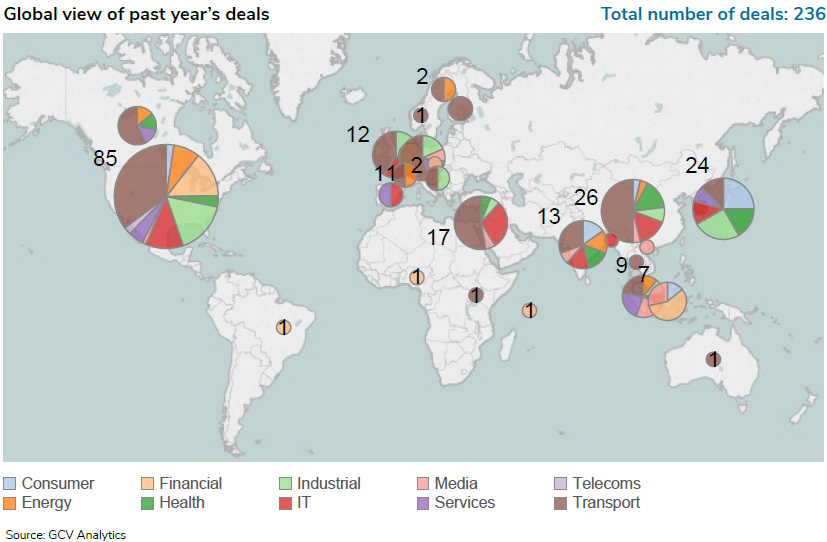
Many of those commitments (86) went to emerging enterprises from the same sector (mostly autonomous and connected car tech and ride hailing and car sharing) as well as into companies developing other technologies in synergies with mobility: 32 deals in the industrial sector (mostly robotics and drones as well as other industrial activities), 29 in the IT sector (mostly artificial intelligence, cybersecurity and enterprise software) and 23 in financial services (mostly payment tech and alternative lending).
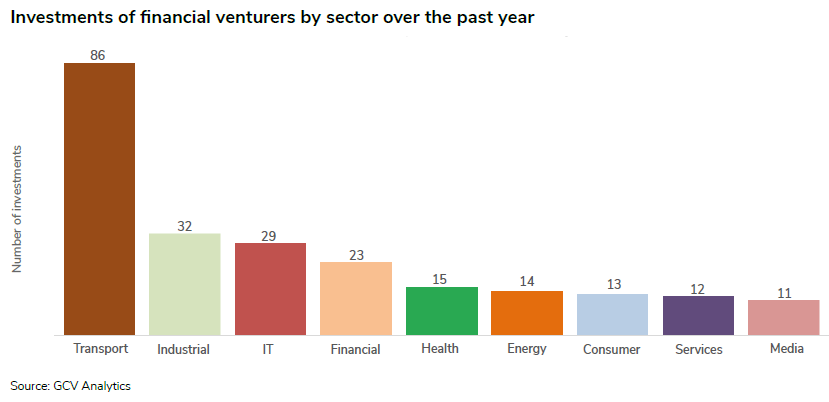
On a calendar year-on-year basis, total capital raised in rounds backed by transport corporates went down from $10.19bn in 2019 to $9.64bn in 2020, representing a 5% decrease. The deal count remained broadly flat at 162, versus the 169 rounds reported in 2019. The slight decreases were clearly attributable to the shock from the outbreak of the covid-19 pandemic. However, investment activity of corporates took off and soared in 2021 with 236 deals recorded by mid-December 2021 and an estimated total capital committed in those at $21.94bn. This explosive growth, much like in other sectors, was a reflection of generous liquidity injections by central banks which impacted on asset prices in both public and private markets.


The leading corporate investors from the financial sector in terms of largest number of automotive manufacturers BMW, Porsche and Toyota. The list of transport corporates committing capital in the largest rounds was headed by carmakers Volkswagen, Ford and General Motors.
Sector specialist: Amy Daniels Burr, president, JetBlue Technology Ventures
JetBlue Technology Ventures (JTV), the corporate venture capital (CVC) and innovation arm of US-based airline operator JetBlue Airways, is led by president Amy Burr.

Before becoming president in July 2021, Burr had been managing director of operations and partnerships for three years from 2018, where she focused on building an ecosystem of partners and deployment opportunities for the many technologies of JTV’s portfolio companies.
As head of JTV, Burr will lead JetBlue’s strategic venture investment direction and help integrate startups into the airline’s overall corporate innovation initiatives. She will report to Brandon Nelson, JetBlue’s general counsel and corporate secretary, who also serves as oversight officer of JTV.
Nelson, who was involved with the creation of JTV in 2016 and has served on the subsidiary’s investment committee as chair for the past several years, said: “Amy has done a phenomenal job leading the JTV team over the past several months, and we are looking forward to seeing her bring her innovation experience to life as part of JetBlue’s leadership team.”
Sector specialist: Matthew Tsien, president, GM Ventures
Matt Tsien serves as executive vice-president (EVP) and chief technology officer (CTO) at US-based carmaker General Motors (GM) and is also president of its corporate venturing subsidiary, GM Ventures. He conducts research and development and venture investments on behalf of the unit.

Tsien assumed the roles in April and July 2020 respectively after the retirement of Jon Lauckner. GM Ventures partners and backs entrepreneurs working on mobility and automotive technologies that can be adapted by GM’s cars, manufacturing plants and operational teams.
Tsien has been at GM since 1995 and had most recently been president of the group’s GM China division in 2014 to lead its electrification and connectivity strategies in the country. During his time in China, he helped GM strengthen its business there and leverage technologies such as electrification and connectivity for long-term growth.
Having begun his career at Delco Electronics, a vehicle electronics design and manufacturing arm of GM, in 1976 as an electrical engineer, Tsien designed embedded system for automotive applications and managed advanced work in navigation and telematics.
Deals
Corporates from the transport sector invested in large multi-million-dollar rounds, raised by enterprises from the same sector as well as from other sectors like energy and financial services. Four of the top 10 deals were above the $1bn mark.
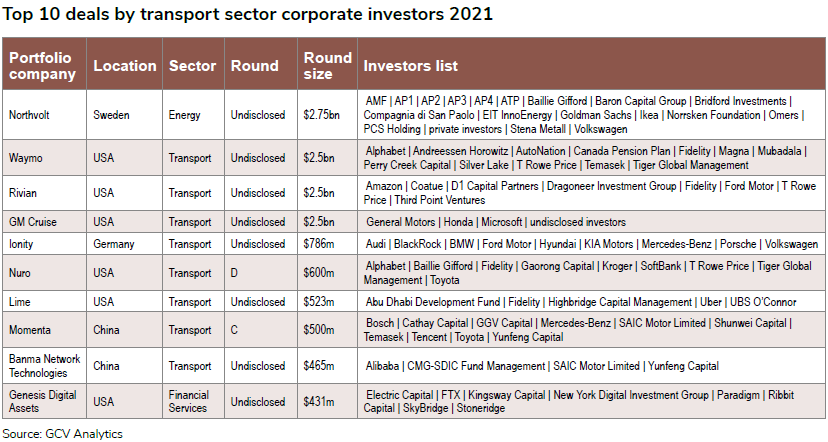
Volkswagen invested $620m to co-lead a $2.75bn private placement for Sweden-headquartered battery producer Northvolt that also featured commercial vehicle producer Scania. The round was co-led by investment bank Goldman Sachs’ Asset Management subsidiary, pension funds AP1, AP2, AP3, AP4 and Omers Capital Markets, a vehicle for pension fund manager Omers. The financing will support the expansion of the company’s Gigafactory from a capacity of 40 GWh per year to 60 GWh per year. It is considering building another two facilities by 2030 to handle a projected increase in demand. Northvolt manufactures lithium-ion batteries for use in electric vehicles in addition to portable electronics products such as drones, and the storage of renewable energy.
Waymo, the autonomous driving technology developer spun off by US-headquartered internet and technology group Alphabet, raised $2.5bn in funding from investors including its former parent company. Automotive retailer AutoNation and automotive component manufacturer Magna International also took part in the round, as did investment and financial services group Fidelity Management & Research. Sovereign wealth funds Mubadala and Temasek filled out the round together with Andreessen Horowitz, Canada Pension Plan Investment Board, Perry Creek Capital, Silver Lake, Tiger Global Management and funds and accounts advised by T Rowe Price. Waymo is developing an autonomous driving system called Waymo Driver for use in driverless vehicles in the taxi, package delivery and freight industries. It has launched an autonomous taxi service in the US city of Phoenix and has a logistics offshoot dubbed Waymo Via. The funding will be channelled into enhancing Waymo Driver, which has powered test drives in some 25 US cities, in addition to upping headcount.
E-commerce group Amazon’s Climate Pledge Fund and Ford Motor Company co-led a $2.5bn funding round for US-based electric truck developer Rivian. The round was also co-led with investment firm D1 Capital Partners and funds and accounts advised by T Rowe Price, and included Third Point, Fidelity, Dragoneer Investment Group and Coatue Management. FoRivian is about to begin production on a range of electric trucks that will include an electric pick-up truck dubbed the R1T as well as the R1S, an all-terrain electric sports utility vehicle. Its vehicles are also set to be supplied to Amazon to serve as their last-mile delivery vans.
US-headquartered autonomous driving technology developer Cruise raised more than $2bn from investors including software provider Microsoft and General Motors and Honda. The corporates were joined in the round by undisclosed institutional investors, and the cash was provided at a $30bn post-money valuation. Microsoft invested through a strategic partnership that will involve it combining its cloud computing and software and hardware engineering capabilities, manufacturing expertise and partner ecosystem with Cruise’s to bolster the commercialisation of the latter’s technology. The corporate will also be Cruise’s preferred cloud services provider. Cruise is working on autonomous driving software that will be used in all-electric vehicles forming the basis for shared taxi services, in addition to hardware such as sensors, robotics and telematics systems.
Ionity, the Germany-headquartered electric vehicle (EV) charging network set up by a range of automotive manufacturers, raised €700m ($786m) from its existing backers in addition to investment management firm BlackRock. BlackRock took part in the round through its Global Renewable Power platform and the proceeds will be allocated to quadrupling the number of Ionity stations to some 7,000 by 2025 as the company looks to expand its presence to trunk roads and urban locations. Founded in 2017 by carmakers BMW, Ford Motor Company, Mercedes-Benz, Volkswagen Group, Audi, Porsche, Hyundai Motor Group and its Kia subsidiary, Ionity oversees a range of EV charging stations spanning highways in 24 countries, facilitating long-range travel. The funding will also be channelled into expanding some of the company’s existing stations from four chargers to between six and 12.
US-based autonomous vehicle developer Nuro raised $600m in series D funding from investors including internet technology provider Google, grocery chain Kroger and telecommunications and internet group SoftBank’s Vision Fund 1. Tiger Global Management led the round, which also featured Toyota’s Woven Capital fund, investment and financial services group Fidelity, Baillie Gifford, Gaorong Capital and funds and accounts advised by T Rowe Price. Nuro has developed autonomous electric vehicles used to deliver products such as groceries or medication. It will allocate the cash to technology development, hiring and expanding the commercial deployment of its technology.
US-based urban mobility service Lime has raised $523m in convertible debt and term loan financing from investors including ride hailing service Uber. Uber, investment and financial services group Fidelity, Abu Dhabi Growth Fund and Highbridge Capital Management provided $418m in convertible debt while UBS O’Connor supplied a $105m term loan. Founded in 2017, Lime provides electric scooter and bicycle rental services in 120 cities worldwide. It will use the capital to boost its growth and expand into more cities globally, while about $20m of the funding will be deployed to pursue innovations that will further decarbonise its supply chain.
China-based autonomous driving technology developer Momenta raised $500m in a series C-plus round featuring automotive manufacturers SAIC Motor, General Motors, Toyota and Mercedes-Benz, industrial technology manufacturer Bosch and internet group Tencent. Singaporean state-owned investment firm Temasek, Yunfeng Fund, IDG Capital, GGV Jiyuan Capital, Shunwei Capital and Cathay Capital also took part in the capital injection, which includes a $300m investment from General Motors in September 2021. The company said its cumulative series C financing has exceeded $1bn. Momenta has developed technology that uses deep learning software to analyse sensor data in cars and optimise their autonomous driving capabilities, providing comprehensive route planning and prediction.
China-based smart car technology manufacturer Banma Technologies secured up to ¥3bn ($465m) in funding from investors including e-commerce group Alibaba and automotive manufacturer SAIC Motor. Private equity firm Yunfeng Capital and private equity fund manager CMG-SDIC Capital also contributed to the round, which followed a $233m series A round in 2018 led by CMG-SDIC and backed by Yunfeng Capital and Shangqi Capital, a vehicle for SAIC Motor subsidiary SAIC Capital. Established in 2015 as a joint venture between Alibaba and SAIC Motor, Banma produces internet of things-equipped smart in-car electronics systems based on Alibaba’s AliOS mobile operating system. The company’s technology was deployed in SAIC’s Roewe RX5 sports utility vehicle in 2016, and it will use the latest funding to enhance its research and development capabilities.
US-based Bitcoin mining company Genesis Digital Assets secured $431m in a funding round that featured cryptocurrency derivatives exchange FTX. Crypto investment firm Paradigm led the round, which was filled out by Nydig, Stoneridge, Ribbit Capital, Electric Capital, SkyBridge and Kingsway Capital, the last of which had provided $125m for the company just two months before. Genesis aims to be the largest and most profitable Bitcoin mining operation by 2025 and claims to already account for 2.4% of the Bitcoin network, with a data centre capacity of 150 MW. The funds will be used to expand the company’s mining operations using clean energy, and it expects to reach 1 GW of capacity by the end of 2023. It said the round is the largest so far disclosed by a Bitcoin miner.
Exits
Corporate venturers from the transport sector completed 39 exits between January and mid-December 2020 – 15 acquisitions, 17 other transactions (mostly reverse merges with Spacs), six initial public offerings (IPOs) and one merger of equals. The total estimated exited capital in those transactions was $30.7bn.
The number of exits in 2020 (24) nearly doubled the figure from the previous year (14) but more notably the total estimated capital in those exits dropped significantly from $15.01bn to $5.47bn. In 2021, the positive trend in such exits gathered more momentum, however.
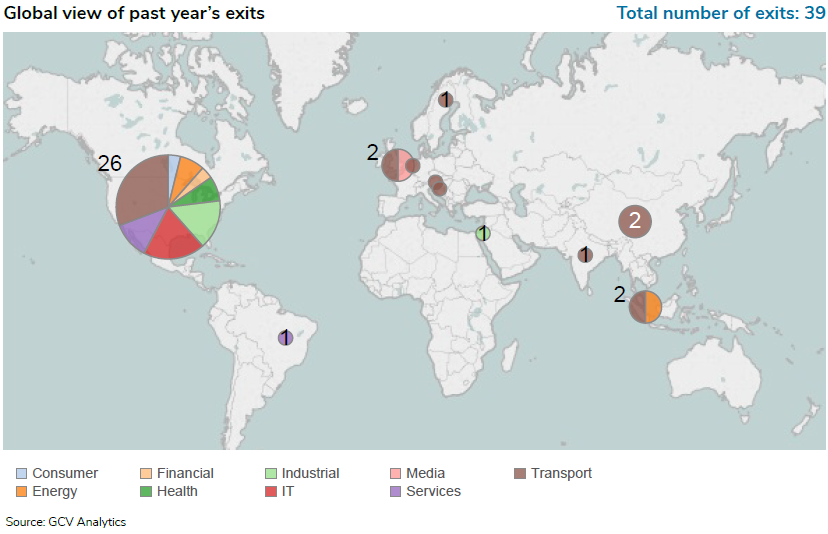
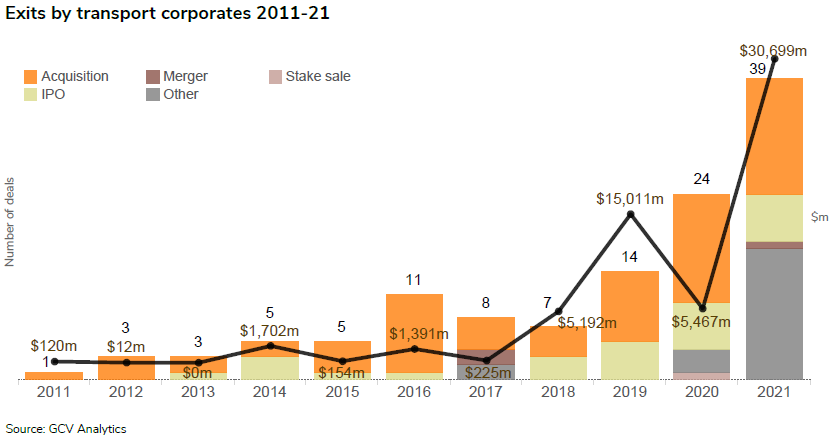

US-based electric jeep developer Rivian went public in an $11.9bn IPO offering that scored exits for corporates Amazon, Ford, Cox Enterprises, Sumitomo and Abdul Latif Jameel. The company increased the number of shares in the offering from 135 million to 153 million and priced them at $78.00 each, above the $72 to $74 range it had set. It floated on the Nasdaq Global Select Market. Rivian began deliveries of its all-electric pickup truck, the R1T, in September 2021 and its sports utility vehicle, the R1S. It is largely pre-revenue but generated a $994m net loss for the first six months of 2021. The offering follows about $10.5bn in funding for the company since it was founded in 2009, $2.5bn of which was raised through a July 2021 round co-led by Ford, Amazon’s Climate Pledge Fund, D1 Capital Partners and funds and accounts advised by T Rowe Price.
China-headquartered ride hailing service provider Didi Global went public in a $4.44bn IPO on the New York Stock Exchange. The company counts multiple corporates among its backers, including internet conglomerate SoftBank, internet company Tencent, e-commerce company Alibaba, insurance firms China Life and Ping An electronics producer Apple, online travel agency Booking Holdings, car rental service eHi and social media company Sina Weibo. Didi increased the number of shares in the offering from 288 million to approximately 317 million American Depositary Shares (ADSs), with four ADSs equalling one class A share. The company priced its shares at the top of the IPO’s $13 to $14 range. Didi plans to use the IPO proceeds for further investment in its technology and international expansion. Formed after the merger of peers Didi Dache and Kuaidi Dache in 2015 and formerly known as Didi Chuxing, Didi operates an on-demand ride service spanning its home country of China but has presence in Russia, Africa, Latin America, Central Asia and the Asia Pacific regions as well. It also offers food and package delivery in addition to automotive and financial services.
Aurora, a US-based self-driving technology developer backed by multiple corporate investors, agreed a reverse merger with special purpose acquisition company Reinvent Technology Partners Y. The combined company will have a $13bn pro forma implied market capitalisation and will take on Reinvent’s listing on the Nasdaq Capital Market, which was secured through an $850m IPO in March 2021. It is sponsored by investment firm Reinvent Capital. The transaction includes a $1bn private investment in public equity (PIPE) financing featuring truck manufacturer Paccar, ride hailing service provider Uber and commercial vehicle producer Volvo Group. The PIPE includes Reinvent Capital, Baillie Gifford, XN, Primecap Management Company, Canada Pension Plan Investment Board, Index Ventures and Sequoia Capital as well as funds and accounts managed by Morgan Stanley’s Counterpoint Global unit and funds and accounts advised by T Rowe Price. Formed in 2017, Aurora is working on an autonomous driving system initially aimed at the trucking market. It expects to launch its first product by 2023 and expand the application of its technology to the last-mile delivery and ride hailing sectors.
Joby Aviation, a US-based air taxi developer backed by corporates Intel, JetBlue, Toyota and Uber, agreed a reverse merger with special purpose acquisition company Reinvent Technology Partners. Baupost Group, funds and accounts managed by BlackRock, Fidelity and Baillie Gifford have anchored a $835m private investment in public equity, while Uber will convert $75m of bonds into equity. Combined with $690m held in trust by Reinvent, Joby Aviation will receive $1.6bn in gross proceeds and the combined business is expected to fetch a $6.6bn post-money valuation. The merged business will trade on the New York Stock Exchange once the deal closes by the end of the second quarter of 2021. Founded in 2009, Joby is developing vertical take-off and landing aircraft to take passengers to their destinations by air. The company has conducted more than 1,000 test flights and intends to launch its service in 2024. Proceeds will allow Joby to begin its commercial flights by getting regulatory approvals and opening manufacturing sites.
TuSimple, a US-headquartered driverless truck producer backed by a host of corporate investors, floated in a $1.35bn initial public offering on the Nasdaq Global Select Market. The CN, Goodyear, Kroger, Mando, Navistar, Nvidia, Sina, Traton, Union Pacific, UPS and US Xpress-backed autonomous truck producer was valued at more than $8.5bn in the IPO. The company issued approximately 27 million class A shares priced at $40.00 each while SunDream, a vehicle for Charles Chao, chairman and CEO of internet company Sina, sold nearly 6.8 million additional shares. The price range for the offering had been set at $35 to $39 and the price gave TuSimple a market capitalisation of approximately $8.53bn. Classic Elite and entities affiliated with Perry Creek Capital Partners are providing another $35m for the company through a concurrent private placement. Founded in 2015, TuSimple is developing self-driving vehicles from bases in the US states of Arizona, New Mexico and Texas intended for land freight transportation, and expects to commercially launch them in 2024. It is pre-revenue but made a $178m net loss in 2020.
Grab, a Singapore-headquartered ride hailing service backed by range of corporate investors, agreed a reverse takeover with special purpose acquisition company Altimeter Growth Corp at an initial pro-forma equity value of $39.6bn. The combined business will take the position secured by Altimeter Growth Corp, an affiliate of technology investment firm Altimeter Capital Management, when it floated in a $450m IPO in October 2020. The valuation makes this the largest ever reverse merger agreement. Funds managed by Altimeter Capital are putting up $750m for a $4bn private investment in public equity (PIPE) financing deal supporting the transaction that includes conglomerate Sinar Mas, clove cigarette producer Djarum and investment and financial services group Fidelity. Formerly known as GrabTaxi, Grab’s core business is its on-demand ride service but it has diversified into food and package delivery as well as financial services, through an offshoot that raised more than $300m in January 2021.
Polestar Performance, the Sweden-headquartered electric vehicle (EV) producer spun off by carmakers Volvo Cars and Geely, agreed to merge with special purpose acquisition company Gores Guggenheim at an expected $20bn valuation. The merged business, Polestar Automotive Holding, will take the place on the Nasdaq Capital Market secured by Gores Guggenheim – formed by affiliates of private equity firm The Gores Group and investment adviser Guggenheim Capital – in a $750m initial public offering in March 2021. The transaction will be supported by $250m in private investment in public equity financing from unnamed institutional investors. Polestar has developed a hybrid electric sports car called the Polestar 1 and an electric five-door hatchback, the Polestar 2. It expects to launch three more vehicles in the next four years beginning with a sports utility vehicle in early 2022.
23andMe, the US-based genetic testing service backed by corporates Alphabet, WuXi AppTec, Johnson & Johnson, GlaxoSmithKline (GSK), Roche and Illumina, agreed a reverse merger with a special purpose acquisition company (SPAC). VG Acquisition Corp, which is sponsored by conglomerate Virgin Group, floated on the New York Stock Exchange in a $480m initial public offering in October 2020, and the merged business will take its listing on the exchange. The transaction will value the company at $3.5bn and will be supported by $500m in financing from Virgin founder Richard Branson, 23andMe co-founder and CEO Anne Wojcicki, funds managed by investment and financial services group Fidelity, Altimeter Capital, Casdin Capital and Foresite Capital. Founded in 2006, 23andme provides home testing kits that customers send back in order to get information on genealogy and/or their potential genetic susceptibility to certain diseases.
Circle, a US-based blockchain payment platform developer backed by several corporate investors, agreed a reverse merger with special purpose acquisition company Concord Acquisition Corp. The combined business will be valued at $4.5bn through the deal and will pick up Concord’s listing on the New York Stock Exchange, which it acquired in a $276m IPO in December 2020. Circle’s existing shareholders will retain approximately 86% of the merged company’s shares. The merger was supported by $415m private investment in public equity financing from investors including financial services and investment group Fidelity and hedge fund managers Marshall Wace, Adage Capital Management and Third Point as well as accounts advised by Ark Investment Management. Founded in 2013, Circle operates a digital payment processing system that leverages a regulated and fully reserved dollar digital currency dubbed USD Coin. The platform has facilitated more than 100 million transactions representing tens of billions of dollars, according to Circle’s website.
IonQ, a US-based quantum computing technology developer exploiting University of Maryland and Duke University research, agreed to list through a reverse takeover. The company is merging with dMY Technology Group, a special purpose acquisition company that floated on the New York Stock Exchange in a $275m IPO in November 2020. The combined business will have a pro forma implied valuation of $2bn. The transaction will be supported by $350m in private investment in public equity (PIPE) financing from investors including carmaker Hyundai Motor Company, its Kia subsidiary and GV, a corporate venturing subsidiary of internet and technology group Alphabet. Investment and financial services group Fidelity Management & Research, Silver Lake, Breakthrough Energy Ventures, MSD Partners and Time Ventures.
Funds
For the period between January and mid-December 2021, corporate venturers and funds investing in the transport and mobility sector secured over $3.14bn in capital via 21 funding initiatives, which included 13 VC funds and eight newly launched and rebranded CVC subsidiaries.
The number of funding initiatives in the transport sector stood at 18 in 2020, same as the previous year but down from the peak at 31 registered in 2017 and from the 24 in 2018. The total estimated capital also decreased slightly from $4.20bn to $2.99bn and this downward trend appeared to have somewhat reversed in 2021.
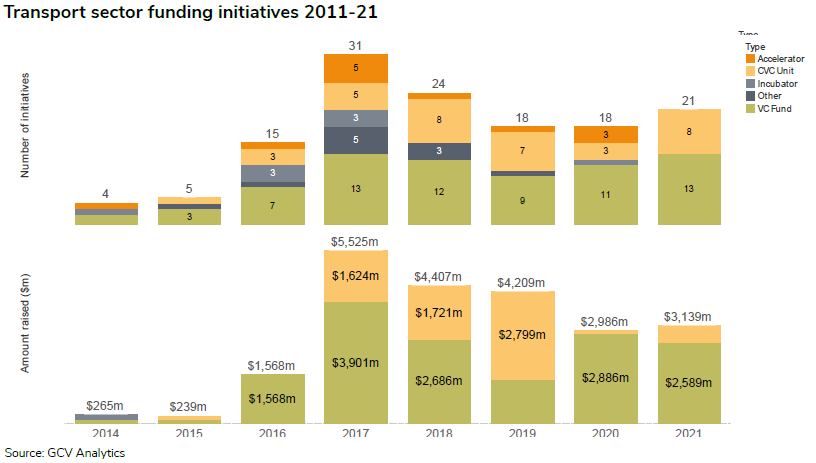
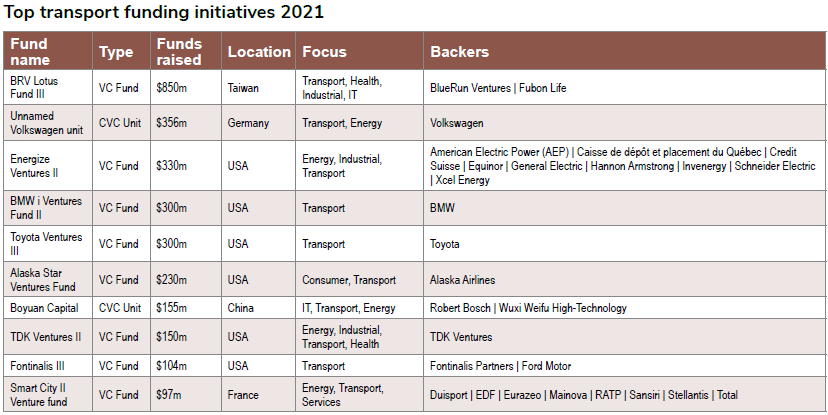
Fubon Hyundai Life Insurance, the insurance arm of Taiwan-based financial services conglomerate Fubon Financial Holdings, is backing BlueRun Ventures’ latest fund with $20m. The commitment would represent a stake of roughly 2.4% in the BRV Lotus Fund III fund which would put the vehicle’s total capitalisation at about $850m. The firm’s BRV Lotus Fund II had closed at over $500m in 2016, a figure nearly triple the size of its predecessor, and focused on investments in China, Japan and South Korea. BlueRun invests in series A and pre-series A rounds related to areas such as autonomous vehicles, artificial intelligence, the internet of things, smart manufacturing, medical services, with ticket sizes typically ranging between $1m and $10m. The firm’s portfolio includes athlete management software provider Kitman Labs, computer vision developer AlwaysAI, solar lighting technology developer Petra Systems, housing co-investment provider Haus, state lottery app operator Jackpocket and gig economy platform Drum.
Volkswagen announced plans to to set up a €300m ($356m) corporate venture capital fund. The cash will be allocated to startup companies as well as decarbonisation initiatives, and Diess named robotic taxis, car sharing and vehicle electrification as crucial branches in the decarbonisation of the private transport sector. The yet unnamed fund is the first to be formally launched by the carmaker. It has not been among the most frequent corporate venturers in the automotive space but has made several large late-stage investments. Volkswagen put up $620m to co-lead a $2.75bn private placement for advanced battery manufacturer Northvolt in June 2020, and had provided $2.6bn in capital and assets for autonomous driving software developer Argo AI in a mid-2019 deal valuing it at $7bn.
Energize Ventures, a US-based venture capital offshoot of power producer Invenergy, closed a $330m second fund featuring a host of corporate investors as limited partners (LPs). Invenergy anchored the fund and was joined by backers including energy management technology producer Schneider Electric’s SE Ventures vehicle and industrial and power equipment maker General Electric’s GE Renewable Energy subsidiary. Energy utilities American Electric Power, Equinor (through its Equinor Ventures subsidiary) and Xcel Energy also committed capital, as did financial services firm Credit Suisse, pension fund manager Caisse de dépôt et placement du Québec and property investment trust Hannon Armstrong. Unnamed institutional investors and family offices supplied 70% of the capital. Formed in 2016, Energize Ventures has over $700m under management and targets energy technology developers focusing on process automation, decentralisation, risk mitigation, electrification and asset optimisation.
BMW i Ventures, the US-based venture capital firm formed by BMW, launched a $300m fund that will focus on sustainability. Launched by its parent in 2016, BMW i Ventures has accumulated a portfolio of some 50 companies including Chargepoint, the vehicle charging network set to list at a $2.4bn valuation, and manufacturing services marketplace Xometry, which floated in a $302m IPO. The latest vehicle will operate alongside the unit’s $500m first fund and will target early and mid-stage companies concentrating on sustainability, transportation, manufacturing and supply chain technologies.
Toyota committed another $300m in capital to its corporate venturing unit, also rebranding it from Toyota AI Ventures to Toyota Ventures. Toyota AI Ventures had been launched under the auspices of the company’s Toyota Research Institute in 2017 with $100m in capital. Toyota subsequently provided a further $100m for its Fund II in late 2019. The capital will be divided evenly between two funds. One of those, Toyota Ventures Climate Fund, will concentrate on developers of innovative technologies to promote carbon neutrality, such as renewable energy and hydrogen production. Toyota Ventures Frontier Fund will invest in developers of technology in areas like artificial intelligence, cloud computing, autonomy, mobility, robotics, smart cities, digital health, advanced materials, energy and financial technology. Jim Adler, Toyota Ventures’ founding managing director, said: “Startups are tackling the world’s challenges, and at Toyota Ventures we want to open even more paths to investing in them.”
US-headquartered air carrier Alaska Airlines unveiled a corporate venture capital subsidiary dubbed Alaska Star Ventures, reportedly equipped with $230m in capital. Alaska Airlines serves some 120 destinations across the US and internationally to Canada, Mexico and Costa Rica, and will use the fund to invest in technologies with the potential to lower its carbon emissions. The vehicle’s first investment is a $15m commitment to the $230m debut fund for VC firm Up. Partners, which has also recruited Toyota’s Woven Capital fund, industrial manufacturer Standard Industries, shipping firm OSM Maritime and property developer Hillwood as LPs. The initiative will be overseen by Pasha Saleh, the corporate’s director of flight operations strategy and innovation.
Robert Bosch Venture Capital (RBVC), the corporate venture capital arm of Germany-headquartered industrial technology producer Robert Bosch, launched a RMB1bn ($155m) China-based investment vehicle. The vehicle, dubbed Boyuan Capital, will be located in the city of Shanghai and will provide funding for deep technology developers. It will be headed by RBVC investment partner Hongquan Jiang as chairman and managing director. The RMB1bn figure represents the targeted close for Boyuan Capital’s first fund, Bosch China RMB Growth Fund I, which is also backed by automotive component manufacturer Wuxi Weifu High-Technology. Areas of interest for the fund include automotive and mobility services, smart manufacturing, artificial intelligence, semiconductors, carbon neutrality and internet-of-things technology.
TDK Ventures, the corporate venturing capital subsidiary of Japan-based electronics producer TDK, closed its sophomore fund at $150m. The unit intends to tap its second fund to build a portfolio of 50 early-stage companies over the next three years. The fund will focus on sectors including clean technology, advanced materials, industrial, robotics, energy, autonomous vehicles, electric vehicles and health technology. TDK Ventures typically invests between $250,000 and $5m in each funding round. Incubator Mach49 advises TDK Ventures, which launched in July 2019 with the close of its $50m first fund. It has since exited fuel cell technology developer GenCell, laser manufacturer SLD Laser and 3D printing technology provider Origin. It has 16 companies in its portfolio and $200m of assets under management. Nicolas Sauvage, managing director of TDK Ventures, said: “This new fund renews our commitment to supporting hard-tech entrepreneurs creating innovations for the greater good.”
US-based mobility-focused venture capital firm Fontinalis Partners closed its third fund, Fontinalis III, at $104m with commitments from LPs including Ford. Over 30 limited partners made commitments into Fontinalis III, including corporate investors in the automotive and insurance industries, as well as institutional investors, family offices and individuals. The vehicle will focus on seed to series B rounds, targeting mobility specialists and enabling technologies that it deems as having an outsized impact on mobility. It has reportedly already made five series A investments and participated in six seed rounds. It took part in a $253m equity raise for Highland Electric Transportation, a provider of electric vehicle solutions for school districts and fleets, in February 2021 alongside Vision Ridge Partners and existing investors.
France-based private equity firm Eurazeo raised €80m ($97m) for the first close of its Smart City II Venture fund, after securing commitments from several corporates. LPs include car manufacturer Stellantis, electric utilities EDF and Mainova, public transport operator RATP, energy producer Total, logistics company Duisport and real estate developer Sansiri. The fund also received capital commitments from family offices and PRO BTP, a non-profit organisation providing insurance and pension services for the French construction industry. The vehicle is set to invest in early-stage companies operating in the energy, mobility, property technology and logistics sectors globally. Matthieu Bonamy, partner at Eurazeo’s subsidiary, IdinvestPartners, said: The smart city venture strategy aims to select and support the future global leaders in each of their sectors thanks to an expertise in our investments themes and a selectivity rate at the level of the best generalist funds.” Eurazeo’s first fund in the series, Smart City I Venture Fund, completed close to 25 investments in companies located across Europe, Asia and North America.
University backing for transport companies
By the end of 2021, we had registered 14 rounds raised by university spinouts developing transport-related technologies, a decrease over the 21 recorded in the previous year. The level of estimated total capital deployed in 2021 stood at $177m, considerably down from $610m in 2020. This suggests that high valuations of transport and mobility enterprises may be drying up liquidity for earlier stage deals at the moment.
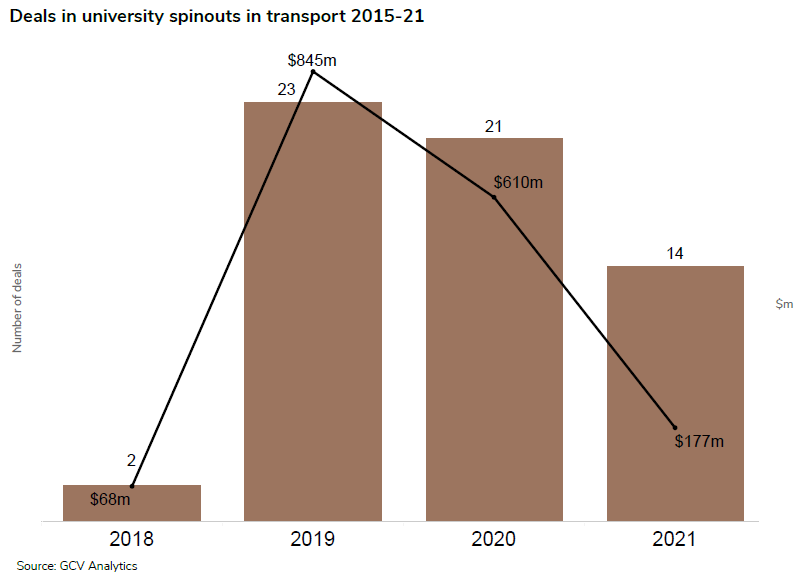
People
We reported several notable people moves in the transport and mobility sector in 2021.
US-listed airline operator JetBlue named Amy Burr president of its corporate venturing subsidiary, JetBlue Technology Ventures (JTV). Burr replaced Bonny Simi, who served at the company for 18 years, launching JTV for its parent in 2016. She took up a position as head of air operations and people at JTV-backed vertical take-off and landing aircraft developer Joby Aviation in December 2020 but will continue to advise the JTV team. Reporting to JetBlue’s general counsel and corporate secretary Brandon Nelson, Burr will oversee the unit’s strategic venture capital investments and corporate innovation initiatives. JTV had hired Burr as managing director of operations and partnerships in 2018 and she was involved in establishing networks and deployment opportunities for many of its portfolio companies. She was previously featured in Global Corporate Venturing’s Emerging Leaders list.
Aircraft producer Boeing spun off its corporate venturing unit, HorizonX Ventures, in a secondaries deal with AE Industrial Partners (AEI), a capital provider to the aerospace industry with $3.5bn in assets under management. The move followed a similar restructuring of peer Airbus’s 67 innovation vehicles into the Airbus InnovationX unit under Christian Lindener and Airbus Ventures under managing partner Thomas d’Halluin, as covid-19 impacted travel. The current HorizonX Ventures team, led by Brian Schettler – a GCV Powerlist 2020 award winner – since its launch in 2017, will move to AEI HorizonX with its current portfolio. Schettler will lead the new platform and become a partner at AEI. Boeing will continue to be a long-term strategic investor in AEI HorizonX and will remain the anchor investor for the current fund in addition to AEI HorizonX’s first standalone fund, which is planned for 2022.
BMW i Ventures announced its latest fund together with the appointment of Marcus Behrendt and Kasper Sage as managing partners, Behrendt having joined the unit as CEO in 2018. Sage was hired as principal in 2016 before being promoted to partner two years later. He appeared on GCV’s Rising Star list in 2018 and 2019. Baris Guzel, who joined as a senior associate in 2016 before moving up to principal in early 2019, has been upgraded to partner.
Daniel Wedberg, founder and managing director of Sweden-based truck maker Scania’s corporate venturing unit, left to join electric vehicle startup Inzile as CEO. Wedberg set up Scania Growth Capital in early 2017 and its deals include battery provider Northvolt, which recently raised $2.75bn. Inzile develops a fossil-free, modular transport and service and previous CEO and founder, Ragnar Åhgren, will remain within the company in business development. Wedberg said: “Inzile is a fantastic company that is perfectly positioned for the future in sustainable urban transport.”
United Airlines, a US-based flight operator, launched its corporate venturing unit.United Airlines Ventures will focus on sustainability concepts that support the company’s goal of net-zero emissions by 2050, as well as other travel-related startups. Michael Leskinen, United’s vice-president of corporate development and investor relations, will oversee the venture unit as president and incorporate its initial investments in Archer Aviation, Clear and Fulcrum BioEnergy.
